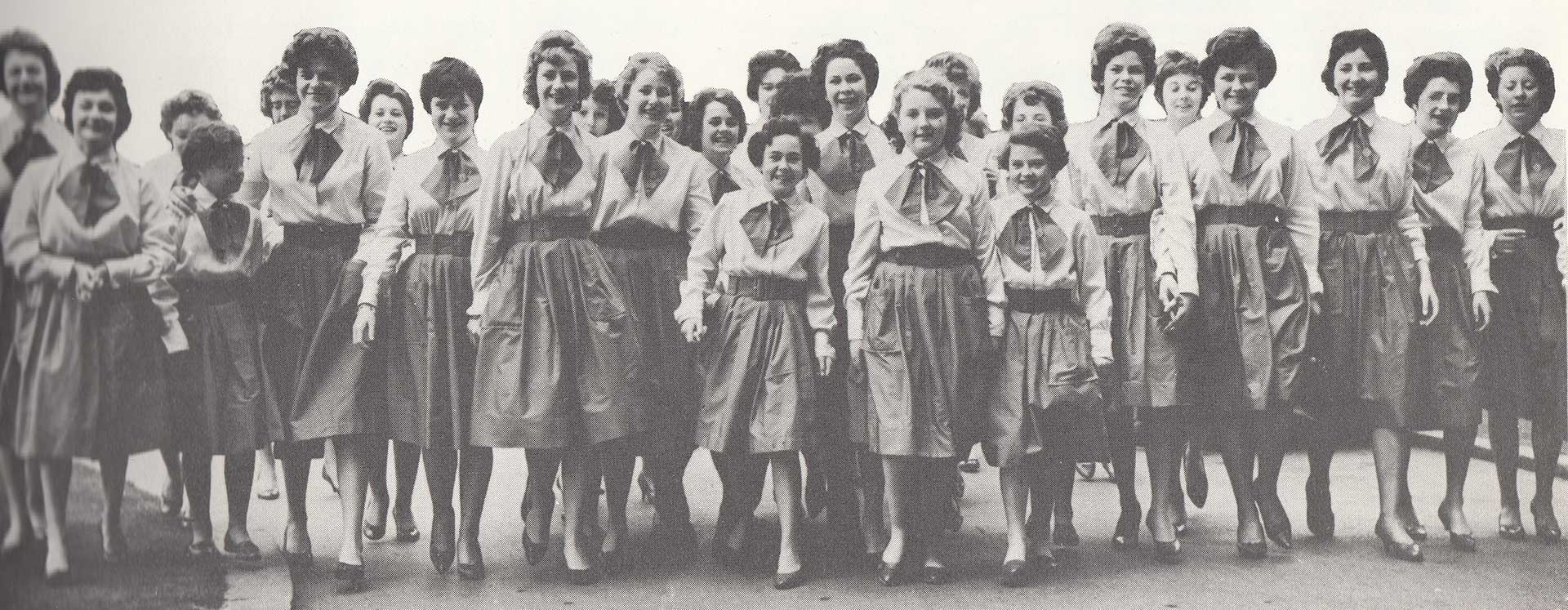
The Doncaster Wheatsheaf Singers was originally formed in 1950 under the auspices of the Doncaster Co-operative Society at the suggestion of Mr. John Barker – its founder and musical director for 32 years. The group was initially made up of young female singers and went under the title The Doncaster Wheatsheaf Girls Choir.
Pre-history
The choir initially started in the last year of the Second World War when John Barker brought together a group of girls to perform operettas, including one that he had co-written himself. As these productions carried on the group advanced from unison singing to singing in harmony and the girls realised they enjoyed the singing just as much as the dressing up and acting. As a result they asked Mr Barker whether they could meet and sing all year round.
The Beginning
Despite having no experience of choral work Mr Barker suggested that a choir was created. As a result in 1950 the Wheatsheaf Girls’ Choir was formed. The age limit was raised to 16 years and Madge Barker, wife of the conductor, joined the choir as pianist.
They decided very quickly that the precision and co-ordination of performances was infinitely better when the music was sung from memory, and as a result the policy of not using sheet music came into effect and still applies today (although new members are allowed a bit of leeway).
The Doncaster Wheatsheaf Girls Choir performing on Opportunity Knocks, broadcast 14 October 1967


Change of Name
Early in 1993 the decision was made to rename the group The Doncaster Wheatsheaf Singers in order to recognise the increasing age range of its loyal members – many of whom had joined as young girls and remain with them today. However, the group still actively encourages young members to join them and ran a seperate junior choir until 2007.
This small group of dedicated young singers quickly became renowned across the North of England for the high standard of their performances. As their fame spread, so did the locations of their concerts. In 1956 the choir found themselves on their first, of what would become many, trips abroad. They had been invited to attend the twinning ceremony of Doncaster with St. Germain-en-Laye in France.
This exciting experience whetted the choir’s appetite and European tours became an important part of the choir’s development, visiting the Czech Republic, Ireland, France, Spain, Sweden, Holland, Germany, Austria, Switzerland, Hungary and the Jersey in the Channel Islands. Some of these countries on more than one occasion. The most exciting of its tours was in 1994 when it was invited to sing in South Carolina, U.S.A.Although in more recent years the choir have not embarked upon foreign tours they have had many successful tours in the UK, which included performances at the London South Bank Centre and Covent Garden’s St. Pauls Church as well as amazing performances in Edinburgh Cathedral, both the Liverpool Anglican and Metropolitan Cathedrals and more recently in Manchester Cathedral.


Moving On
The choir remained under the musical direction of John Barker until his death in 1982. At this point it was his wife who took up the baton as conductor. She initially led the group from the piano until Kenneth Jackson was appointed accompanist in 1985. Both Mrs. Barker and Mr. Jackson remained with the choir until their retirement in 1999.
Over the following years the choir continued to flourish under the Directorships of Urszula Weber, Angela Teasdale, Stephen Burnage and Daniel Fields, who due to opther commitments made the difficult decision to step down from the position of Musical Director in 2020. Taking up the role is Ray Gallagher, an extremely talented musician who has worked with the choir before as a deputy accompanist and who is now stepping up as MD to help lead the choir forward.
Simon Corner, who had been our deputy accompanist until 1999 also became our lead accompanist. A role he was to retain until the Christmas of 2014, when sadly due to family commitments, he made the decision to step down (although he does still deputise as MD and accompanist to the choir when required, so we haven’t entirely lost him). Although Simon was a hard act to follow we have been very fortunate in obtaining the musical expertise of a local pianist – Joanne Bostandji, who is proving to be yet another major asset to the group.
Co-operative
(Co-op)
From the beginning the choir became an auxiliary group of the Co-operative Society, obtaining some funding toward the running of the group. This continues today and we were proud to have been selected as recipients of funding in the new Co-op Local Community Fund in Doncaster in 2017. We have also retained a strong link with the Co-operative Group by organising and performing in their annual Co-op Charity Christmas Concert which raises thousands of pounds for local charities each year.
